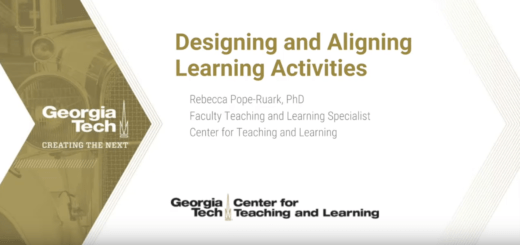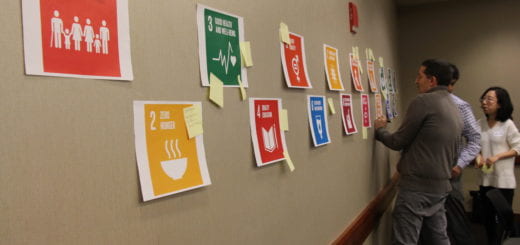An Ethic of Care in a Time of Disruption

Blog posts in the Keep Teaching series are written by CTL faculty and faculty from around the Institute to offer advice and inspiration during the COVID-19 disruption. For official Institute academic continuity resources, visit this page. You will also find more teaching and learning tips on the CTL Keep Teaching site.
 I spend more time than I should browsing through #AcademicTwitter and #AcademicChatter threads on Twitter and reading thoughtful essays about higher education’s collective and unprecedented move to remote teaching for at least the rest of spring semester. I’m struck by how the conversation has turned from how to work with technology to how to care for our students through that technology and our pedagogy.
I spend more time than I should browsing through #AcademicTwitter and #AcademicChatter threads on Twitter and reading thoughtful essays about higher education’s collective and unprecedented move to remote teaching for at least the rest of spring semester. I’m struck by how the conversation has turned from how to work with technology to how to care for our students through that technology and our pedagogy.
While some still raise (important) questions about rigor and academic integrity in the online space we find ourselves, overwhelmingly we see faculty members who care deeply about their students, want to advocate for their students, and genuinely miss meeting with their students. These faculty recognize that, as disorienting as this pandemic and change has been for us, it is even more so for students – students who may have seen our campuses as a refuge, who do not have access to technologies or internet, who have heightened anxiety, and who may be quite personally impacted by the virus.
Below is a set of quotes and tips on the subject of caring for students in the present moment as well as links to the full essays. I hope you will find them as valuable and motivating as I have.
Mays Imad, coordinator of the Teaching & Learning Center at Pima Community College.
“Reflect on the notion of rigor and continue to challenge and support your students. As instructors, we often must balance rigor and support, and this situation might be one where students will need more support than rigor. Establishing continuity doesn’t mean you increase the amount of work required of them. I say this because I worry that some of us might be fixated on the rigor of the materials presented. Let’s face it — the rigor may suffer, and that’s OK considering the situation.”
“Let your students know that you are there for them and that if they need help to reach out to you. Let them know that you are (I hope) in touch with counselors or mental health experts that can help them should they need to speak to someone.”
Joshua R. Eyler, director of faculty development and lecturer in writing and rhetoric, University of Mississippi;
“First, one thing is clear: the rhetoric of care has been central to the discussions universities have been having right now. Front and center in all of the decisions — from closing campuses to emergency policies about P/F, withdrawals, etc. — has been an expression of caring for students. I’m not talking only about their physical health here, though, but about their emotional and psychological well-being as well and the ways in which crises like this affect students’ ability to learn.
There is a thread of the national conversation right now that seems to imagine that higher ed’s only concerns are getting courses online as quickly as possible no matter what, but this hasn’t been my experience. What I have seen is faculty at my institution and beyond really considering their students, thinking about how challenging this situation will be for them, and building educational environments that center community and generosity. Brandon Bayne from UNC, for example, circulated a syllabus addendum on social media that spoke directly to these issues, and it has been shared by thousands of faculty nationwide. Once you make this such a core part of the conversation, you cannot undo it, and it is my hope that higher ed will rebuild on the foundation of these principles.”
Robin DeRosa, director, Open Learning & Teaching Collaborative, Plymouth State University
“When it became clear that we would all need to move to remote learning, there was at first a sense that this meant developing online courses in the same ways that we would do this during more normal times. Now I think people are realizing that the circumstances are anything but normal. Many of our students immediately lost jobs and incomes and were thrust into poverty almost overnight. Many of them don’t have Wi-Fi access, and some of our teaching lecturers don’t, either. As more students and faculty and staff become sick, it’s clearly going to shake our plans yet again. Basically, I think what’s emerging for best practice is that there is no best practice for this yet, and it’s imperative that we all remain flexible and listen to the human beings in our colleges when they tell us what they need both in order to learn and, more importantly, in order to survive.”
Laura Horn, chief program officer, Active Minds, and Anthony Abraham Jack, assistant professor of education, Harvard University
(access via Georgia Tech library portal)
“Share your story. Telling students how your life has been disrupted by the coronavirus, and inviting them to do the same, can create a sense of togetherness and community, says Laura Horne, chief program officer for Active Minds, a national organization that supports mental-health awareness and education among students. The message you’re sending, she says, is that “I don’t just care about academics; I’m here for you as an individual.” Jack suggests that faculty members treat the first online meeting as a check-in. “This is not business as usual,” they might convey. “There are new goals now, and this is how we’ll manage, together,” he says.”
And finally, watch this short video from the Chronicle of Higher Education, who asked 10 faculty members across the country, “What’s the best piece of advice or perspective you’ve gotten?”



